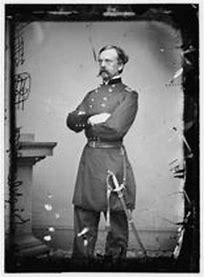American history is complex and some of the key figures are decidedly hard to wrap our heads around from our current perspective.
Pictured is Dan Sickles, an American politician, soldier, and diplomat. What follows are just two aspects of his biography. Google him up in Wikipedia to learn even more.
At 32, he married a girl of 15, and while later serving as a U.S. Congressman, he shot and killed her lover, Philip Barton Key, the son of Francis Scott Key, in Lafayette Square across the street from the White House. You might think that would be the end of Dan Sickles’ story, but it is not. He was acquitted, the first ever to be acquitted using a plea of temporary insanity, the first but not the last.
One of speeches written and delivered in his defense lasted two day and was later published as a book.
In 1861, at the outbreak of the American Civil War, Dan, still somehow a U.S. Congressman, got an appointment as a general. This appointment was based on his recruitment skills and certainly did not reflect his military training. He didn’t have any.
Dan Sickles’ second footnote to history came at the battle of Gettysburg. His superior, General Meade, ordered him to hold a position within the line of Union troops. Against orders, he took his lll corps troops a mile forward to slightly higher ground, thereby disrupting the Union battle line. His new position was indefensible and vulnerable, and his troops suffered a 40% casualty rate. He lost a leg from cannon fire.
Was he court-martialled? No! His mistake, and the sacrifices of his troops have been credited with slowing Southern General Longstreet’s flanking attack, and some say the Union’s victory. He received the Medal of Honor 34 years later.
These are the things that Civil War historians and enthusiasts get into fist fights in bars about to this day!


I guess that in 1859, a jury sympathized with a man cuckolded. Maybe the prosecutor agreed and charged him with Murder One, betting that he would be acquitted, instead of a lesser charge of whatever they had back then for manslaughter. Maybe not.
His behavior at Gettysburg was later repeated by Captain Harry S Truman in the Great War where he ignored orders, went “too far” with his French 75 cannon and crew and destroyed an enemy artillery battery. His colonel threatened to court martial him but did not.
Both warriors thought outside of the boxes decreed by superiors in their hierarchies.
“Thinking outside the Box” is often assoiated with successful, non-regimented, thinking. What should we call it when non-regimented thinking goes horribly wrong? We already have one good name for it. SNAFU!